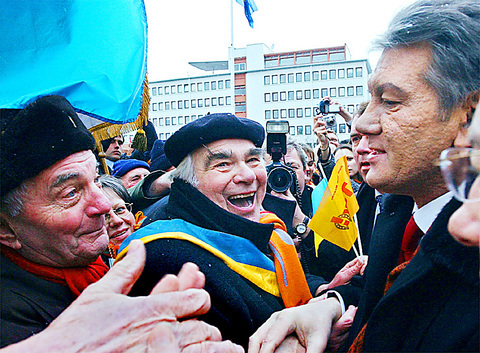Ukrainian President Viktor Yush-chenko called on the EU to commit by 2007 to membership talks for his country.
The call increases pressure on Brussels to embrace Ukraine at a time of little appetite among Europeans for further expansion into poorer parts of the continent. It could also raise concerns in Moscow that Russia's influence over the former Soviet republic might evaporate.

PHOTO: AP
"We have a three-year action plan. We would like it to end in 2007 with a concrete commitment," Yushchenko said on Tuesday shortly before leaving for Kiev, following a speech at the Council of Europe, the continent's top human-rights body.
"At the end of the plan we would start accession negotiations," he added. "It would give us a prospect, a vision for Ukraine."
Yushchenko, who took office on Sunday following a bitterly disputed presidential election campaign that riveted much of the world, will address the European Parliament in Brussels today.
EU foreign ministers are expected to review relations with Ukraine at a meeting in Brussels next week. An immediate goal for Yushchenko is EU recognition of Ukraine as a market economy and backing for its entry in the WTO this year.
EU officials have cautioned that Ukraine -- like other potential applicants -- could face a long wait before actually joining the EU. Earlier on Tuesday, the European Commission gave no firm commitments, proposing more cooperation on trade, immigration, security and foreign relations.
Yushchenko's comments on Tuesday were a clear indication that he wants more -- full membership in the prosperous 25-nation bloc, as well as in NATO.
The reformist leader's overtures to the West have alarmed the Kremlin, which openly backed his opponent, Prime Minister Viktor Yanukovych, in the election campaign.
Ukraine is strategically important to Moscow, which sees the country as a buffer zone between Russia and the expanded EU and NATO, as well as a major transit route for its oil and gas exports.
In a symbolic gesture aimed at soothing those ties, Yushchenko traveled to Moscow and met with Russian President Vladimir Putin on Monday on his first foreign trip as president. By moving on quickly to Strasbourg and Brussels, Yushchenko was signaling the start of a delicate balancing act he is likely to follow in coming years.
Even in Strasbourg, Yushchenko stressed that he wants a "strategic relationship" with Russia, telling the European officials: "We have our eternal neighbor Russia with a huge market. Not understanding this market would be a huge mistake."
Also on Tuesday, Yushchenko and Georgian President Mikhail Saakashvili -- who also favors a pro-Western course -- opened an art exhibit entitled "Rose Revolution of Georgia and Orange Revolution of Ukraine."
Like Yushchenko, Saakashvili came to power amid mass demonstrations against a fraudulent vote count that would have awarded elections to his Kremlin-backed opponent.

Shamans in Peru on Monday gathered for an annual New Year’s ritual where they made predictions for the year to come, including illness for US President Donald Trump and the downfall of Venezuelan President Nicolas Maduro. “The United States should prepare itself because Donald Trump will fall seriously ill,” Juan de Dios Garcia proclaimed as he gathered with other shamans on a beach in southern Lima, dressed in traditional Andean ponchos and headdresses, and sprinkling flowers on the sand. The shamans carried large posters of world leaders, over which they crossed swords and burned incense, some of which they stomped on. In this

Indonesia yesterday began enforcing its newly ratified penal code, replacing a Dutch-era criminal law that had governed the country for more than 80 years and marking a major shift in its legal landscape. Since proclaiming independence in 1945, the Southeast Asian country had continued to operate under a colonial framework widely criticized as outdated and misaligned with Indonesia’s social values. Efforts to revise the code stalled for decades as lawmakers debated how to balance human rights, religious norms and local traditions in the world’s most populous Muslim-majority nation. The 345-page Indonesian Penal Code, known as the KUHP, was passed in 2022. It

‘TRUMP’S LONG GAME’: Minnesota Governor Tim Walz said that while fraud was a serious issue, the US president was politicizing it to defund programs for Minnesotans US President Donald Trump’s administration on Tuesday said it was auditing immigration cases involving US citizens of Somalian origin to detect fraud that could lead to denaturalization, or revocation of citizenship, while also announcing a freeze of childcare funds to Minnesota and demanding an audit of some daycare centers. “Under US law, if an individual procures citizenship on a fraudulent basis, that is grounds for denaturalization,” US Department of Homeland Security Assistant Secretary Tricia McLaughlin said in a statement. Denaturalization cases are rare and can take years. About 11 cases were pursued per year between 1990 and 2017, the Immigrant Legal Resource

‘DISRESPECTFUL’: Katie Miller, the wife of Trump’s most influential adviser, drew ire by posting an image of Greenland in the colors of the US flag, captioning it ‘SOON’ US President Donald Trump on Sunday doubled down on his claim that Greenland should become part of the US, despite calls by the Danish prime minister to stop “threatening” the territory. Washington’s military intervention in Venezuela has reignited fears for Greenland, which Trump has repeatedly said he wants to annex, given its strategic location in the arctic. While aboard Air Force One en route to Washington, Trump reiterated the goal. “We need Greenland from the standpoint of national security, and Denmark is not going to be able to do it,” he said in response to a reporter’s question. “We’ll worry about Greenland in